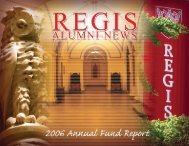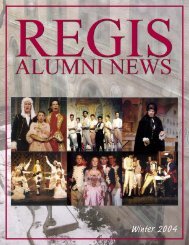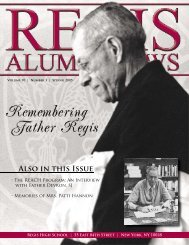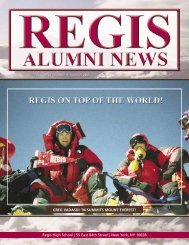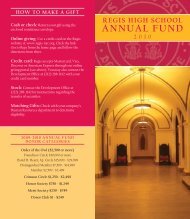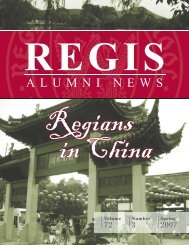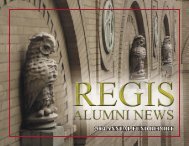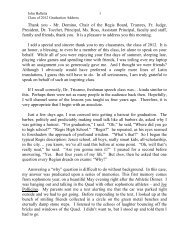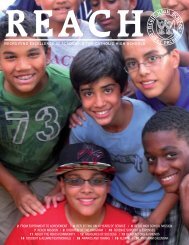REGIS
RAN - Dec 03 FINAL 1-4-04.indd - Regis High School
RAN - Dec 03 FINAL 1-4-04.indd - Regis High School
- No tags were found...
Create successful ePaper yourself
Turn your PDF publications into a flip-book with our unique Google optimized e-Paper software.
Ignatian Understanding<br />
By Rev. Kenneth<br />
Caufield, S.J.<br />
In the last essay in Ignatian Understanding,<br />
I focused on Chris<br />
Lowney’s (’76) book, Heroic Leadership.<br />
In that book he points out<br />
four principles he found in Jesuit<br />
formation that have contributed to the<br />
Jesuit success story over the centuries. The four principles<br />
are: self-awareness, ingenuity, love and heroism. Chris<br />
shows that the first principle, self-awareness, is attained by<br />
the use of the Examen at least twice a day and from making<br />
The Spiritual Exercises (the 30 day prayer experience he<br />
makes in the novitiate—the beginning of his Jesuit training—and<br />
again in tertianship—about 15 years later at the<br />
end of his Jesuit training). In previous issues (Vol. 67 No.<br />
4, Vol. 68 No. 2 and Vol. 68 No. 4) I have talked about the<br />
Examen and The Contemplation to Obtain the Love of God<br />
(the last prayer exercise in The Spiritual Exercises). Both of<br />
these prayer exercises help one to be self-aware and to be<br />
balanced, (indifference and ingenuity are words also used<br />
by Lowney to describe this quality). Lowney sees the quality<br />
in this light: “…disposes people not just to think outside<br />
the box but to live outside the box”(p.281). A little further<br />
on he states: “Indifference leads people to root out provincialism,<br />
fear of the unknown, attachment to their own status<br />
or possessions, prejudice, aversion to risk, and the attitude<br />
that ‘we’ve always done it this way’. And when people see<br />
their whole world as their home, they can turn a hopeful,<br />
interested and optimistic gaze towards new ideas, cultures,<br />
places and opportunities.” (p.281)<br />
Lowney then gives some examples of ingenuity from Jesuit<br />
history (Matteo Ricci in China and Roberto de Nobili in<br />
India). I would like to point out some recent examples of<br />
this ability “to innovate and adapt to a changing world” that<br />
have happened right here in the United States and one right<br />
here at Regis. In the early 60’s the Jesuit high schools in the<br />
province tried something new called The Higher Achievement<br />
Program. It is an enrichment program that helps students<br />
who have completed the seventh grade to hone their<br />
skills in math and language arts over the summer and on<br />
Saturdays during the school year, so that they could pass<br />
the entrance examinations for the Jesuit high schools or the<br />
other Catholic high schools or the special public schools.<br />
This program continues to work rather well.<br />
Another program that was developed right here in the New<br />
York Province is the Nativity Middle School Program. This<br />
is a full middle school program with a six week summer<br />
camp each summer. It also provided supervised study halls<br />
during the school year in the afternoon right after school<br />
and in the evening right after the family supper.<br />
These study halls provided a place to study and an atmosphere<br />
where it could be done. There are over forty Nativity<br />
Middle Schools in the United States run by various groups.<br />
Recently, one started up outside this country, so the Nativity<br />
Middle School movement is now international. A strong<br />
and guiding force in the development of this program is Dr.<br />
Michael V. Mincieli of the Regis Guidance Department and<br />
Fr. John J. Podsiadlo, S.J.,a long time director of the Nativity<br />
School project on the lower East side.<br />
Right here at Regis there is the REACH for Regis Program.<br />
It is a summer program with a summer camp for 3 weeks<br />
and another three weeks at Regis, as well as ten Saturdays<br />
each semester during the school year. This program runs<br />
from the summer after fifth grade to the end of eighth grade.<br />
It deals with young men whose families are below the poverty<br />
line. The last program I want to mention is the Cristo<br />
Rey High School which first opened in Chicago developed<br />
by interested Jesuits and lay people under the direction of<br />
Fr. John Foley, S.J. Once again it is aimed at students who<br />
cannot afford and have not been prepared for the traditional<br />
Jesuit High School. The school year has been extended and<br />
the students work one day a week in a business firm where<br />
the money they earn goes toward their tuition. These young<br />
men are involved in their own education in a very concrete<br />
way. The New York Jesuits will sponsor along with some<br />
other religious congregations a Cristo Rey high school in<br />
New York within a year.<br />
All of these innovative, educational experiments have been<br />
developed and carried out by Jesuits and lay people working<br />
together. Ingenuity is alive and well and I am sure Ignatius<br />
is smiling down on all of these projects. These gifts<br />
flow from the Church and from the Church renewed by<br />
Vatican II.<br />
8 <strong>REGIS</strong> ALUMNI NEWS



